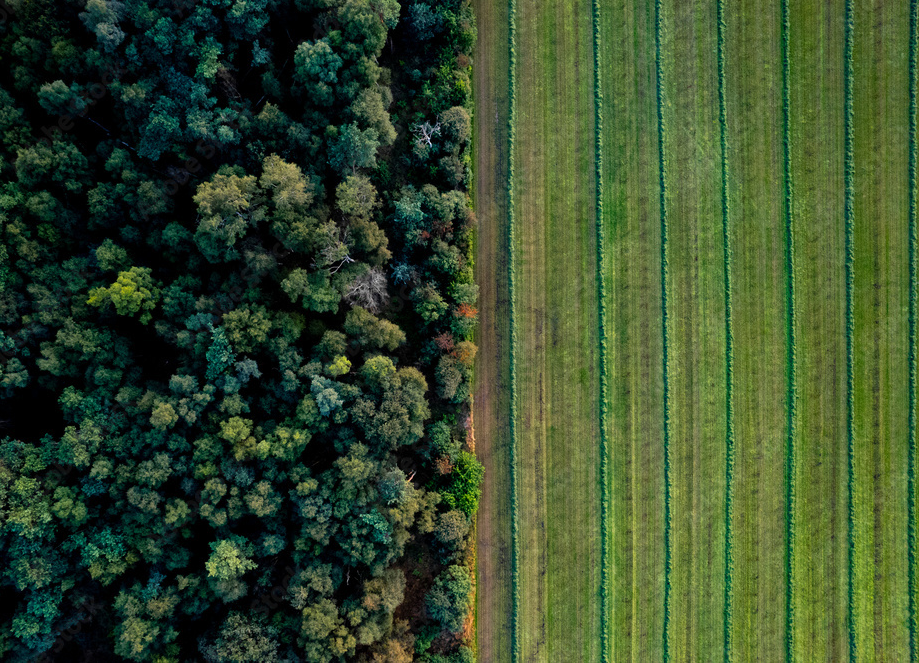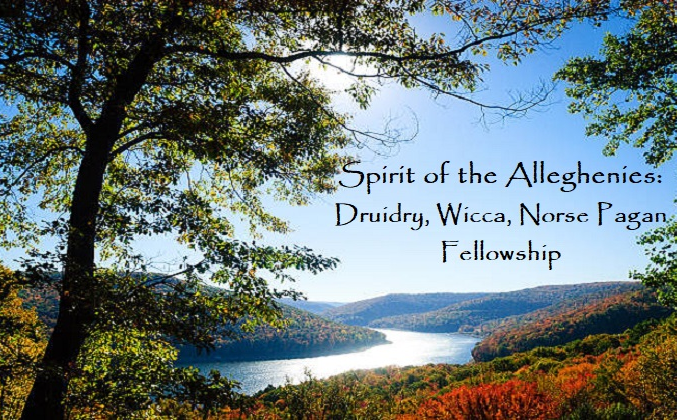Long before the arrival of the Celtic race on Albion’s fair shore, the children of Dôn, the Great Mother Goddess, and her consort Beli, the bright Sunlight, lived and prospered in the Kingdom of Cymru (Wales). The Goddess and the God had one daughter named Arianrhod, whose name means ‘Silver Wheel’, for her province is the celestial moon, and they had four sons, the twin brothers Gwydion and Gilfaethwy, both enchanters of no small repute, the legendary smith Gofannon and the renowned hunter Amaethon. It was said that Amaethon possessed such skill and hunting finesse that he could track any beast by night or day, stalk his quarry in silence and stillness, and deal a mortal blow with a single swing of his axe or arrow from his bow.
Thus, we find Amaethon stalking a swift roebuck through the deep wood, pausing only briefly to read the trail. A broken twig here, an overturned stone there. The roebuck paused as well and sniffed the air, trying to detect the scent of the hunter. An ear twitched as it strained to hear the predator’s footfalls or its labored breathing.
At once, at the sound of a twig breaking, it burst forth and ran hard against the wind, its heart beating fiercely in its chest, every sinew toned and perfected for one purpose…to outrun death and live another day. Amaethon moved in measured strides, his breath warm in his lungs, his ash-shaft spear held fast in his hand, vigilant for the moment when he would strike and fell his prey. He was closing now. Blood rushed through his veins. He yearned to hurl his spear and claim the roebuck’s life. Only through the beast’s death could he and his family survive. Life for life. The hunt; the ancient dance; the way.
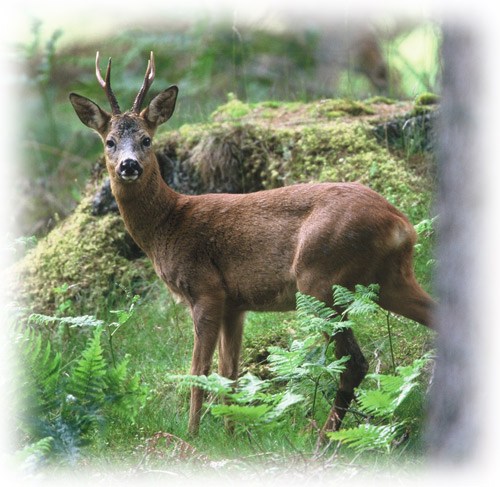
The roebuck stood upon a high rock with his head turned toward the hunter. Their eyes met across the vale. Amaethon drew his spear and anchored his stance. His muscles tensed, but before he could let the spear fly the roebuck vanished into thin air. Climbing up the rock, he scouted over the far edge and discovered a cave entrance large enough for a roebuck to enter. Curiosity overcame him, and Amaethon crawled into the crevice, which opened into a vast passage delving down into dark earth. He felt the impressions of the roebuck’s hooves in the soft earth, tracks both coming and going, and realized that the deer must have traversed the passage many times, but from where?
In blinding darkness, Amaethon descended farther and farther under the hill. Just as he contemplated turning back, he perceived a faint glow some distance ahead. It grew into a visible light, the cavern’s other opening. Cautiously, he edged forward, his spear ready to strike either prey or foe. A strong man, son of a God and Goddess, Amaethon was not prepared for the sight that greeted him. Another world, bright and vivid, bathed in daylight from an unknown sun. Green hills and open prairie, marked here and there by ancient trees older than his world. In the distance, before the land opened onto a boundless and beautiful sea, there stood a great revolving castle. The roebuck, Amaethon now realized, had led him to the Otherworld!
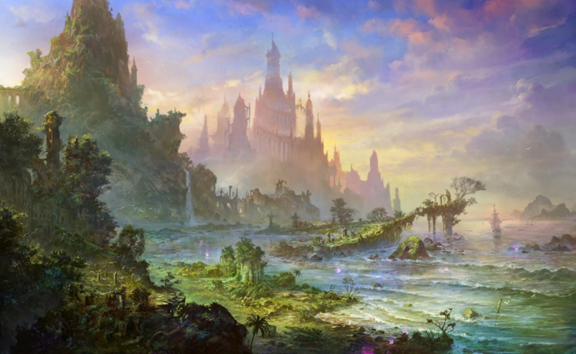
It took a few minutes to adjust to the brightness. The roebuck had eluded him; but as he looked toward the castle, he spied a lone man surrounded by strange beasts moving down a hill. Amaethon approached the stranger and hailed him. The stranger turned and studied Amaethon for several moments before speaking in an archaic tongue. “S’mai!” the stranger exclaimed, “Braf cwrdd â chi. Rwan ydy f’enw i.” Greetings! It is an honor to meet you. My name is Now.”
“We are well met,” Amaethon replied. “I too am honored! My name is Amaethon of Cymru, son of Dôn and Beli. Could you tell me to what land have I come?”
“You are come to the Otherworldly Kingdom of Annwn, wellspring and source of all life.”
“I was hunting a magnificent roebuck,” Amaethon explained, “but it eluded me.”
“The roebuck belongs to King Arawn,” Rwan replied. “It often passes through the cavern into the Otherworld to graze and mate but returns each night to the castle. It is one of three animals prized above all else by the king.”
Puzzled, Amaethon said, “I have seen many roebuck exactly like this one. Why does your king revere this roebuck above any other?”
“Along with the King’s lapwing and dog,” replied Rwan, “the roebuck is keeper of the king’s greatest secret, which King Arawn guards jealously.”
Intrigued, Amaethon convinced Rwan to accompany him to the castle, where he hoped to meet King Arawn and view the prized animals. Along the way, they passed by flat meadows in which strange plants were growing in rows furrowed into the earth. Rwan explained that this was wheat and barley, magical plants that could be made into bread and ale. When Amaethon asked where all of the people were, Rwan informed him that people in Annwn lived forever young and suffered neither sickness nor death, and so they spent their time pursuing the delights of Caer Feddwid, the Court of Intoxication, where the replenishing cauldron supplied unending wine, or at Caer Wydyr, the Fortress of Glass, where resided the ancient Well of Wisdom. Rwan then told Amaethon that he too would have his choice of pursuits: pleasure or knowledge. Standing at the outer gates, Amaethon beheld the awesome castle, rotating peacefully above the waters of the sea. Several small islands surrounded it and on each was a wonder to behold, more mysterious and magnificent than anything he had ever seen. Descending upon the revolving castle were three rays of purest light, the Awen or rays of divine inspiration. “Behold Caer Siddi,” Rwan announced, “the royal palace of Annwn and home of the Great King Arawn!”
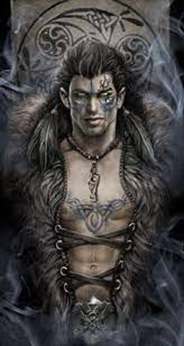
Hearing that a visitor from Cymru had arrived at Caer Siddi, King Arawn ordered that Amaethon be brought forthwith to the Great Hall. The hunter was awe-struck by the castle and grounds. Never had he beheld such riches displayed in one place. King Arawn greeted Amaethon warmly and invited him to indulge in ale and conversation. King Arawn was a stout and hearty man, who bore his crown well and inspired respect by his very countenance, and by his embrace Amaethon knew well that he was not a man with whom one should trifle. The king seemed to have a curious familiarity with Cymru, especially with the Kingdom of Dyfed.
When they reached the garden, Arawn sat down on a bench, and said, “You are not the first of your kind to grace these halls, Amaethon? Long ago, I fought against a rival named Hafgan. A giant of a man, he challenged my sovereignty for the throne of Annwn. We met in combat, but no matter how grievously I wounded him, he recovered to fight again the next day. I knew I could not defeat him with any power I possessed. One day, I hunted and killed a stag in the forest. I had just set my dogs upon the beast, when the Cymri King, Pwyll of Dyfed, came upon the stag and drove off my hounds. I seized the rogue and demanded restitution. The Cymric king agreed to pay any price to restore honor and amity between us, so I enlisted his help in defeating Hafgan. For a year and day, I exchanged places with Pwyll so that he reigned as King of Annwn and I as King of Dyfed. We each took the form of the other so that no one would suspect our deception. At year’s end, Pwyll fought Hafgan and killed him in a single mighty blow. When I returned to Annwn, I learned that Pwyll had reigned justly in my stead; and he, likewise, learned that I had increased the wealth of his kingdom nine-fold and had brought an era of peace and prosperity to his people.”
Amaethon told King Arawn that he too had been hunting a roebuck that led him to Annwn. He told of his meeting with Rwan and the journey to Caer Siddi. “I have seen many wonders in your Kingdom”, Amaethon told Arawn, “but there is one that surpasses all others…may I set my eyes upon the three beasts you prize above all else…your dog, lapwing and roebuck?”
The King replied without hesitation, “If it is within my power, all the hospitality of Caer Siddi is yours. I will show you my beasts at once!”

They made their way to the walled royal gardens, where Amaethon beheld a great wolfhound barking aggressively. The King made a small gesture with his hand and the dog ceased at once. “His name is ‘Guard the Secret,’” the King explained, “for he is my most loyal companion, and he will ever defend my sovereignty. He is descended from the noble wolf but is as gentle as he is fierce.”
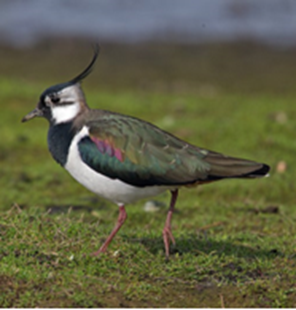
Amaethon spotted the lapwing near the center of the garden. No sooner had the bird noticed them than it ran across the garden. “The lapwing’s name is ‘Disguise the Secret’,” continued Arawn, “for she always conceals her eggs, her treasure, from thieves by disguising them and performing a clever ruse in which she runs away from her nest to lure predators away as well.”
The roebuck stood at the far side of the garden, the very same roebuck that he had tracked all the way to Annwn. Amaethon slowly walked toward the beast as Arawn spoke: “His name is ‘Hide the Secret’, for he avoids capture through swiftness and guile. He is often the emissary between our worlds.”
“Together,” King Arawn said, “these three beasts protect my greatest secret!”
“I do not wish to offend,” replied Amaethon, “but might I know this greatest of secrets?
Arawn leveled his gaze on Amaethon and at last said, “They guard the secret of Agriculture, the knowledge and power to tame the wilderness. No one must know this secret.”
“But why?” questioned Amaethon. “Why not give this knowledge to the men of the earth that they might have an easier life?”
“Look around you, Amaethon,” Arawn answered. “Annwn is a vibrant land. It is the unspoiled place from which the living forms of your world pour forth. It is harmony and balance. If I were to give my secret over to the men of the earth, they would seek to tame all of nature and they would bring only destruction in their wake. Men do not possess the wisdom of harmony and balance.”
For several days, Amaethon stayed at Caer Siddi and King Arawn showed him unending hospitality. Wanting for nothing, Amaethon was treated to unimaginable feasts and marvelous wonders, but he could not stop thinking about the Secret of Agriculture and its possibilities in Cymru. He concluded that he must steal the King’s dog, lapwing and roebuck and bring them through the long dark cavern back into the light of his world.
Late on the ninth night of his sojourn in Annwn, Amaethon stole away in the darkness while the King and his retinue slept soundly. He made his way to the garden, muzzled the dog, and tethered the roebuck, and then coaxed the small lapwing into a satchel that he drew over his back. As silently as he could manage, Amaethon escaped through the castle gates and made it past the wheat and barley fields to the edge of the hills under cover of darkness. Well pleased with himself and the success of his illicit adventure, Amaethon steadily climbed up the grassy hillside meadows until the cave entrance appeared blacker than the night.
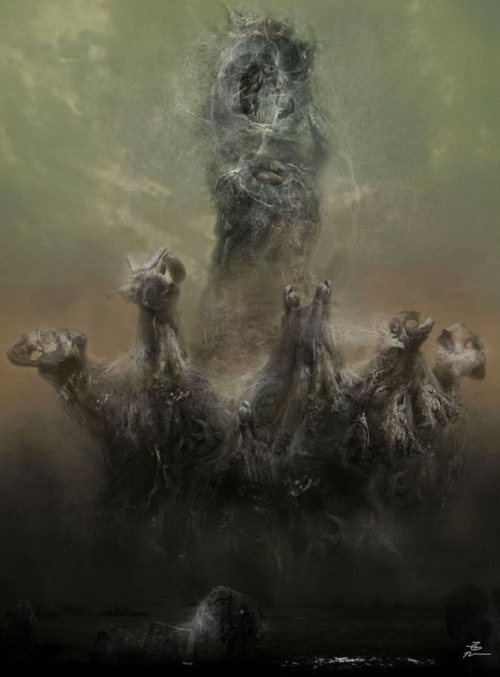
When King Arawn learned of Amaethon’s treachery, fury burned in his heart at the betrayal. He summoned his servant Bran, a hero of the mortal realm who, upon his death, became commander of Annwn’s armies. Arawn told Bran of the theft and ordered him to release the terrible Cythraul from its bonds and set it to rage upon the earth. The Cythraul was a monstrous being that took many forms and delighted in the destruction of all that was good. The monster had long been bound in the deep earth, for its destructive power was unpredictable.
Bran descended into the depths of the castle and followed a series of dark passageways until he came to the chamber of the imprisoned Cythraul. He turned a great stone wheel until the monster’s bonds were released. A wail arose from the depths and hateful mist filled Annwn. Cythraul was loosed in the land. Arawn then ordered Bran to rally an army of living dead to scourge the land, and by the power of his magical Cauldron of Regeneration, could be reborn again and again. Bran chose as his Lieutenant a renowned warrior named Gwyn ap Nudd and took his place at the head of the host to lead the assault on Cymru and recover the stolen beasts.
The armies of Annwn were ready to march and, with the Cauldron of Regeneration they were nearly invincible, but there was a way in which they could be defeated…if an enchanter among the enemy could correctly guess Bran’s name, they would then have power over the army, for there is great power in a name. To protect against this weakness, Bran disguised himself as a dark cloaked spirit carrying a magic alder branch (the ancient source of his power).
Amaethon emerged from the cave at daybreak and ran to the home of his brother Gwydion, whose magical prowess was second only to their uncle Math ap Mathonwy. No sooner had Amaethon related his tale and shown Gwydion the three sacred animals, than a great and horrible cry arose from the land. Gwydion immediately cast a spell to conceal the three animals and went to see what foul abomination uttered such a cry. The sight that greeted them on the plain was pure horror. A titanic serpent several times taller than the trees and with one hundred heads, each in gruesome mockery of some natural creation. As the beast passed through the lands, the sky blackened, the mountains warped, and the forest caught fire and blazed as hot as a potter’s kiln. One of the heads was a crested snake that devoured the souls of those caught in its path of waste. “The Cythraul,” Gwydion said.
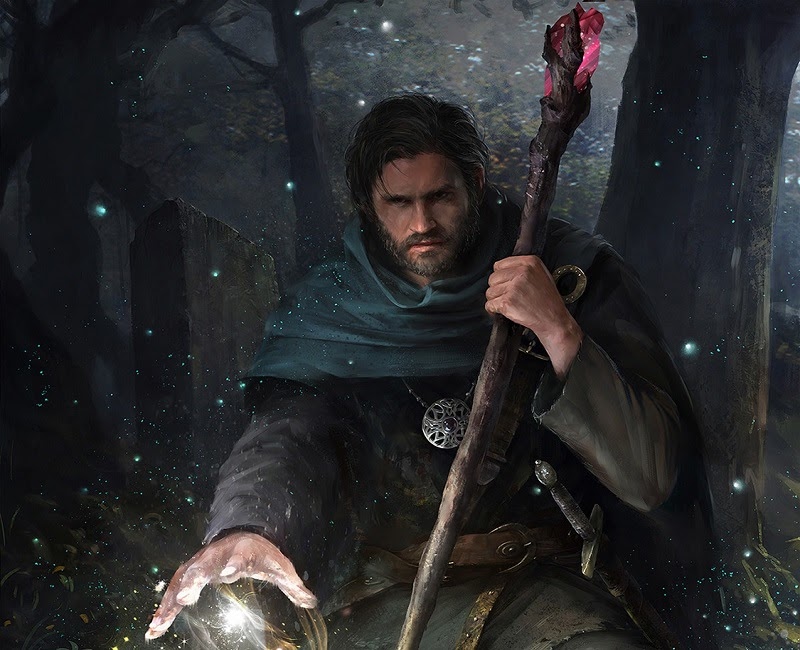
Gwydion took up his staff of enchantments and then instructed Amaethon to remain with his treasures while he made way for the forests of Achren. A plan had formed in his mind, for Gwydion knew the secret of the Cythraul, that it embodied a destructive force combatted only by life-sustaining power. The magic Gwydion learned from Math ap Mathonwy taught him how to harness a living power called Nwyfre, which was found throughout nature but was strongest and most concentrated in trees. Every tree is a living bridge between the three realms, its roots extending down into the Underworld, its trunk growing up through the Earthly realm, and its canopy of branches reaching into the Sky realm. A tree is an axis that channels Nwyfre through the three realms. Gwydion’s plan was to harness the Nwyfre flowing through the trees and use it to animate them. An army of trees, life-sustaining by their very nature, could defeat the great Cythraul.
Gwydion stood amidst the ancient trees. The magical preparations for casting the spell were few, but he would have to move through the forest animating each kind of tree in the order of the awakening of their spring foliage, for only in this way would the trees take their proper place in the ranks of the forming army. Moving first to the Alder, Gwydion lifted his staff high above his head and began reciting the ancient incantation. At once, the air grew still in the forest and the Alder trees began to stir. A great wind rushed through the grove carrying whispers. The trees were awakening and speaking to one another! With an earth shuddering quake, the Alder trees uprooted themselves and began their march toward the Cythraul.

The Cymri looked on as the trees fought on the field of Goddeu Brig. They had formed themselves into four ranks…the mighty chieftains, led by the Oak and Birch; the peasants, led by Ash and Yew; the shrubs, led by the wise Hazel; and the brambles, who fought to hold their enclosure and keep the Cythraul contained. Twenty species of tree and bush had answered Gwydion’s call and fought bravely against decay and destruction. The trees assaulted the Cythraul with root and branch, hurling rocks and pinning it to the ground. The undead warriors decimated the front lines of the tree army. They swung great axes forged from Otherworldly ore, rending foliage and slashing trunks, mortally wounding the trees. It was all that the Elder could do to pull the fallen from the battle and treat their wounds. The Birch, armored as it was, the tips of its branches hard as steel, advanced on the enemy host and bore their blows stoically. With a mighty sweep of its branches, it cleared the fray long enough for Elder to heal. The destroyer discovered that it could not consume the souls of the trees that fell in battle. In fury, it struck down at an Ash, but the cunning tree dodged out of the way and countered by swinging one of his massive branches down upon one of the defiler’s heads, dashing the skull across the earth.
The Cythraul now conjoined its ninety-nine remaining heads into one horrible amalgamation that poisoned all that it touched.

From its high vantage, Pine spied two weaknesses and relayed this to the other trees. Oak and the Alder again led the assault, splitting the tree army into two divisions, one attacking the root of the many heads and the other assaulting the back. Every tree that touched the fiend’s blood withered and died. Nevertheless, the army plowed onward. Oak led the trees forward and began to hack their way through the tangled mess of heads all the way to the root. Meanwhile, Alder’s forces carved a path through the back to join their companions. The acrid flesh desiccated many trees, and yet, they pressed on. The shrubs and brambles labored to maintain their enclosure so that the Cythraul could not escape and poison the countryside. They too suffered the decaying touch of its flesh, but their resolve was still greater and they endured. At last, the two divisions met and severed the abomination in two. The Cythraul released a terrible cry that blackened the hearts of all who heard it, before dissolving into thick oil swallowed by the earth.
The trees regrouped and began to tend to their wounded, but there was little time for celebration, for the remaining armies of Bran were marching against them. Gwydion, though small in stature, joined the ranks of the tree army on the field of Goddeu Brig. He chanted his litanies and directed the flow of Nwyfre. At once, the treetops entangled and formed an impenetrable wall through which the lifeless warriors could not pass. The trees easily dispatched the warriors, but almost as soon as they fell, more emerged from the Cauldron of Regeneration. The battle raged on, yet there appeared to be no fewer warriors than when the battle had first begun. Moreover, the walking dead felt no exhaustion, but the trees felt fatigued from the oncoming storm. Still, they fought on into the night.
Bran scanned the forest for Amaethon and the King’s stolen treasure but espied only a druid among the trees. He ordered the warriors to fall back and regroup, and Gwyn ap Nudd made his way across the darkened battlefield carrying a flag of truce. Coming to Gwydion, he said that his master, the commander of the Army of Annwn, wished to meet with him to discuss terms. Gwydion asked the name of the commander, but Gwyn replied that he was nameless. Gwydion agreed on the condition that while they talked, no further hostilities would ensue. The warrior and the druid agreed and met on a small knoll near Goddeu Brig where both armies could see them clearly.
Bran opened the discussion by asking the name of the enchanter, who responded, “I am Gwydion, son of the Goddess Dôn and the God Beli, and brother to Amaethon. You, I am told, are nameless.”
Bran responded, “Your magic is strong Gwydion. To have defeated the Cythraul and stood against my army is no small feat, but you cannot endure forever, and the number of dead will always exceed the living. If you give the thief Amaethon over to me along with the three beasts he stole from King Arawn, we will withdraw back to Annwn.”
“That I will not do,” Gwydion said, “and my magic will sustain the tree army for all time. Unless you wish to be fighting this battle come winter, and the winter after that, I propose a battle of single combat between us to determine the victor.”
After considering this, Bran replied, “Very well, I agree to a battle of single combat, but since I fight by force of arms and you by magic, how can a fair contest be decided.”
Gwydion replied, “It will be a contest of wit that will decide the outcome of the battle, for you and I are both well equipped for such a contest. I will concede defeat if you can answer my simple riddle: Where does the wand of Math ap Mathonwy grow in the grove?”
Bran recalled all of the druidic lore he had learned over his long years on the earth, but at length could not answer Gwydion’s question. Finally, he said, “I cannot answer you, for I do not know where the wand of Math ap Mathonwy grows in the grove. But you have yet to answer my riddle: What is my name?”
Gwydion studied his opponent for some time before answering wisely, “You are Bran the Blessed, a hero king of old…I recognize you by the Alder sprigs in your left hand, for Alder was a source of great power to the Bran of legend, and though Bran lived and died long ago, I am certain you are he.”
Bran looked at Gwydion in amazement and conceded his defeat. With the sunrise, the threat of the Cythraul and the armies of Annwn had been allayed, and the trees returned to their roots in the forest. Gwydion returned home, exhausted, but no sooner had he entered the roundhouse than Gwyn ap Nudd appeared before him. Amaethon recoiled, but Gwyn wore the face of peace and raised a calming hand.
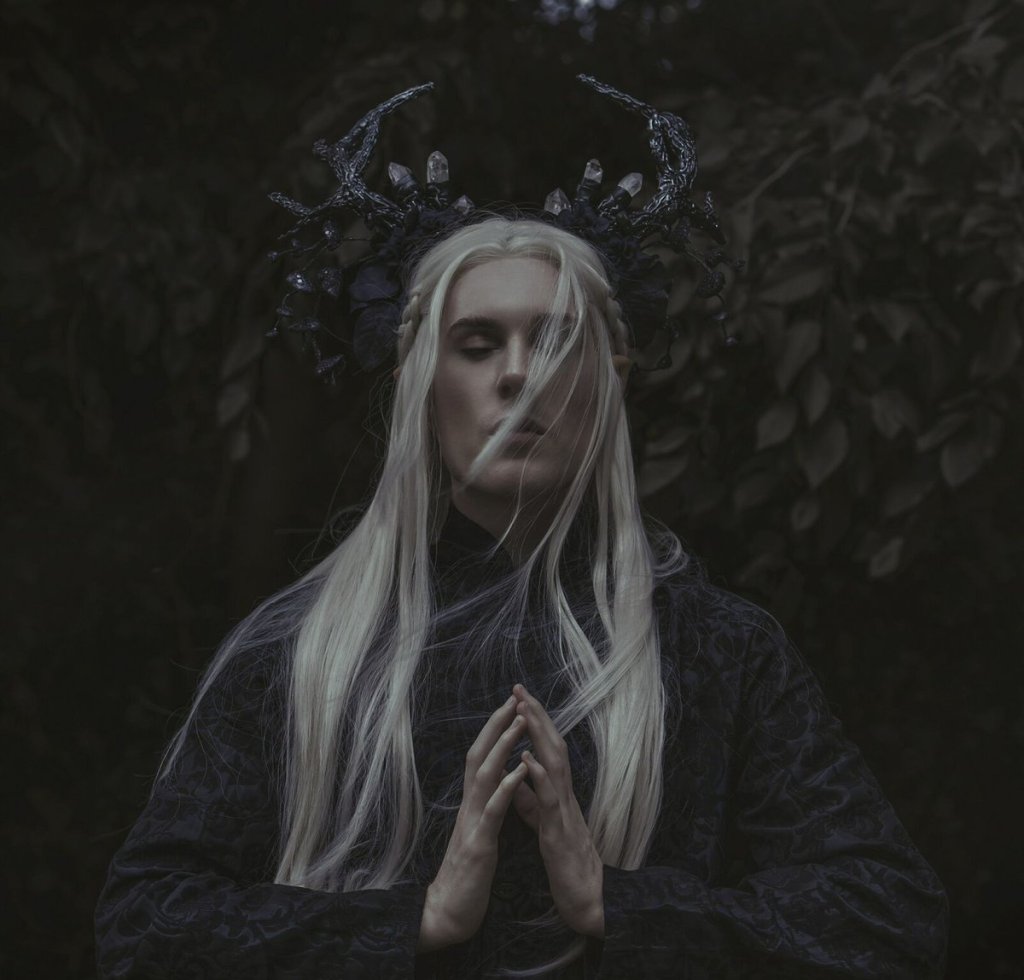
“Forgive my intrusion,” Gwyn said, “but I have come to tell you that Arawn is no longer King. His loss of sovereignty has cost him the throne. I am now King of Annwn, and I wish to assure you there will be no further hostilities between our realms. You may have the secrets of agriculture: the plow to till the ground, the stars to tell you when to plant and reap, and the cow that is food and milk throughout the winter. These belong to humanity and will coexist with the hunting and gathering ways passed down through the generations by your ancestors. Amaethon, once known as a renowned hunter, you will be remembered as a divine plowman. I caution you that Arawn withheld the secrets from humanity for good reason. Use agriculture cautiously lest you unbalance the earth and unravel the knot of creation. There must always be room for the wild places amongst the cultivated lands. Ours is a new order. I wish you well, and I leave you now with my blessing upon you.” With that, Gwyn disappeared and left Gwydion and Amaethon alone with the dog, lapwing, and roebuck, forever keepers of the secrets of planting and harvesting and livestock – a revolution that changed the earth forever.
Long will the valiant deeds committed by the trees in defense of humanity and the earth be remembered by the Cymri and by all Celtic peoples, for the names of the trees and their ranks in the Tree Army are immortalized in the letters of the Ogham alphabet. Never forget what happened at the Field of Goddeu Brig!
